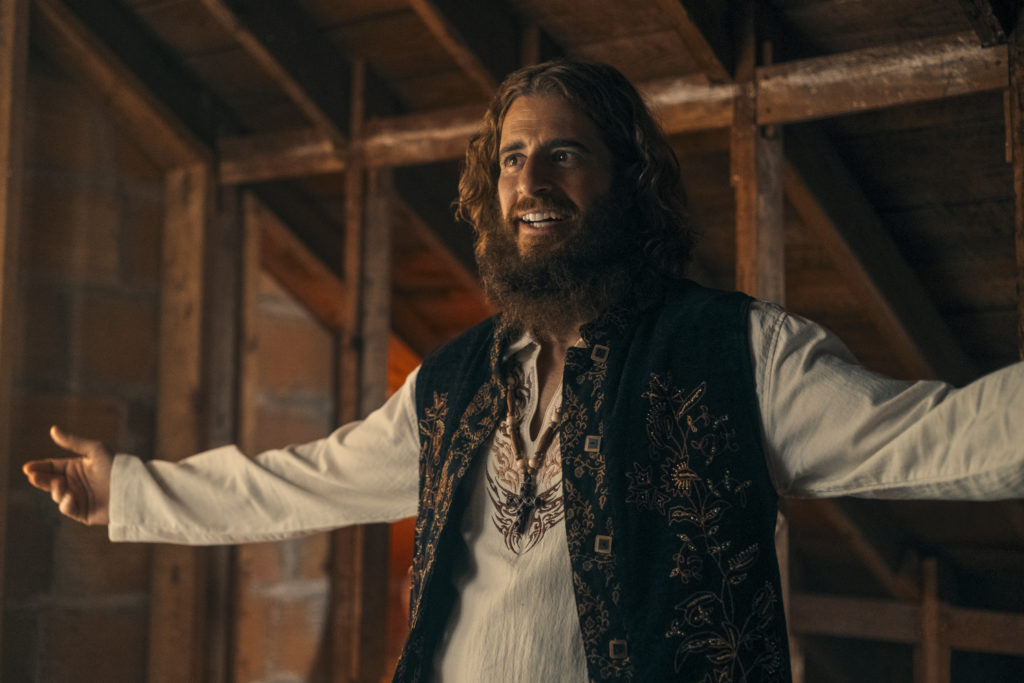I was not expecting much from “Jesus Revolution,” apart from the bad writing and sentimental plotlines typical of many modern Christian movies.
Nor did the subject matter seem promising: Left-leaning, hippie Christians were still a presence in Catholic environments in Italy as I was growing up. I always found them nice and pathetic at the same time, conveying sentimentality and feel-good platitudes.
But “Jesus Revolution,” which premiers in theaters Feb. 24, is a thought-provoking take on the timeless struggle to get young people to come to Jesus. It tells the true story of a revival of Christianity leading up to what Time magazine called “A Jesus Revolution” during a time of profound crisis and distrust in institutions in the 1970s amid the hippie revolution.
Despite some predictable turns in the plot, the story that unfolds raises timely questions. I always find actors playing Christ (or Christ-like figures) unbearable, but Jonathan Roumie, who plays Jesus Christ in the hit TV series “The Chosen,” is surprisingly convincing.
Greg Laurie (played by Joel Courtney) is a young man searching for the right things in all the wrong places (mostly drugs). Meanwhile, Pastor Chuck Smith’s church is empty. The pastor’s daughter is attracted by the hippie movement. She thinks they may be onto something, while her father is afraid she may end up on drugs.
“I ask God to send me a hippie,” he tells her, “because I don’t understand them.” God sends him hippie street-preacher Lonnie Frisbee, played by Roumie.
My people, Lonnie explains to Pastor Chuck, are like sheep without a shepherd. They are a desperate bunch, looking for an answer to their desire for meaning. The hippie movement was not just a bunch of youth trying to get high and get as much sex as they could, the film suggests. Behind the drugs and the protests was a desire for truth and authentic happiness.
It is a precious insight that’s as true then as it is now. It was a favorite theme of St. Pope John Paul II, whose eloquent words to young people at World Youth Day in Rome in 2000 still ring true: “It is Jesus that you seek when you dream of happiness; He is waiting for you when nothing else you find satisfies you; He is the beauty to which you are so attracted; it is He who provoked you with that thirst for fullness that will not let you settle for compromise; it is He who urges you to shed the masks of a false life.”
The “Jesus Revolution” starts from the assumption that young people are really looking for God — whether they are aware of it or not — and that their rebellion should not be dismissed out of hand or ignored. The answer, it suggests, is helping them find a way to him.
The film proposes that the key to this process is a change of form. Pastor Chuck becomes more welcoming, abandons judgment while embracing forgiveness, introduces rock music, and begins to speak the young people’s language. In a short time the church is full again. Interestingly, neither Lonnie nor Chuck propose a different spirituality. Lonnie’s sermons are no different from those of Pastor Chuck before the two met. It is not so much a point of content, but rather establishing a contact.
This, the film suggests, is the solution to the problems of the Church today: Be more open, don’t be judgmental, and change the language to reflect the taste and interests of today’s youth.
And yet, there is little evidence that such an accommodating approach is always effective, or effective in the long term. This is evidenced by the fact that the Boomer generation’s children and grandchildren have all but fled Catholic, mainline, and evangelical churches.
Despite efforts to update marketing and outreach, incorporate contemporary language from the pulpit, and offer ministries defined by categories like age, ethnicity, and sexual orientation, church demographics are rapidly aging — and churches are not exactly brimming over with young people.
But “Jesus Revolution” does, perhaps unwittingly, suggest a more profound answer to the Church’s trouble with the younger generations. Lonnie is a loving, compassionate man. The youth feel loved by him, and the film implies that they would not have listened to his preaching had it come from someone else.
It’s an experience I can identify with: Having grown up Catholic, I heard the “good news” many times since I was little, but only started to truly believe it when I received it from someone whom I knew loved me patiently and unconditionally, when I had been selfish and untrustworthy. This type of love, I realized, cannot be achieved through training, effort, or education, but rather grace.
So perhaps the problem of the Church today is not so much a problem of form, but rather the need for people inside the Church who show this love actually exists. Instead of looking for new forms of communication, a more urgent task is helping lead people toward a more adult faith, one that enables us to look at others the way Lonnie does, and set in motion our own “Jesus revolution.”

